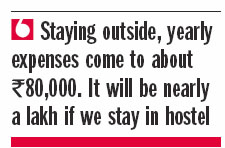Goodbye freedom, hello hard work…
According to a circular, hostel is mandatory for first, second and third year students, numbering around 6,000. The idea is to make students study harder for better grades. But students say it is cheaper to live outside campus..
(Deepthi Shridhar in Mangalore | BM)
Tuesday, April 02, 2013
According to a circular, hostel is mandatory for first, second and third year students, numbering around 6,000. The idea is to make students study harder for better grades. But students say it is cheaper to live outside campus
Life in college hostels is good. But life outside college hostels is better, say those who’ve been there and done that. So when the missive from Manipal Institute of Technology (MIT) arrived, making hostel stay compulsory for first, second and third year students, all hell broke loose. There was shock, anger, dismay, consternation…. There were mutinous mutterings about cages being cages even if gilded with gold. And there was a flurry of activity online.
The announcement, that went up on the notice board on March 20, states: “With effect from the new academic year starting from Aug 2013, living in hostels will be mandatory for the following regular students: First, second and third year students of MIT. Students of fourth year will be provided hostel accommodation, if they want to stay in MIT hostels.”
Prof G K Prabhu, registrar, Manipal University, and professor at MIT, said: “The step was taken based on requests from concerned parents. We initiated the rule keeping in mind the safety of students as well as utilisation of the facilities on campus. The library and few multi-disciplinary labs are open till midnight to help students working
on projects.”
Dr Srikanth Rao, joint director, MIT, said, “Students need to spend a lot of time on campus. However, if students want to stay outside, it has to be authenticated by their parents. Parents must tell the college that they have no problem with the student staying with a local guardian. The rule does not apply to day scholars (local students).”
Also, fourth year students are exempted since most go out for projects or internships.
University sources said the decision is an attempt to prevent ‘outside activity’ and improve grades since the performance of students staying in hostels has been better than those staying outside.
Students, however, are in no mood to see the silver lining around the darkest of clouds hovering over them. Instead, they were busy pouring out their frustrations on social networking sites. According to a poll on Facebook by Manipal The Talk.net, only 12 people agreed with Manipal University. But the majority – 539 – said neither hostel nor mess should be made compulsory. Thirty-seven said only the hostel should be made compulsory, not the mess.
Money matters
Money is a big factor. Gaurav Prakash, a third year student at MIT, said the student council was in talks with the management since most of the second and third year students had already got into a lease agreement.
Besides, one of them said: “Staying outside, we save at least Rs 20,000. For a single year, expenses come to about Rs 80,000 including rent, bills, AC, food and the rest. However, it’s nearly a lakh if we stay in the hostel.”
Countering this, Dr Rao said: “The university provides the best facilities. We also have lower end hostels. Earlier, students used to stay outside because of shortage in hostel accommodation. However, this issue has been taken care of and the university is confident of catering to all students.”
MIT has approximately 8,000-10,000 students and offers various hostel options for students. With effect from March 1 this year, a single air-conditioned room with an attached bath costs about Rs 70,000 per year. This apart, students will have to pay utility charges of Rs 40,000. The utility charges for double AC is Rs 35,000 and Rs 20,000 for non AC. Food costs approximately Rs 35,000 per year.
Curfew means security
Another grouse for students is the curfew. “While we are free to walk in and out of our accommodation, the hostel has its own restrictions,” they said.
First years have to be in the hostel by 9.30pm. For the others, it’s 11pm. But all students have to sign the register every day.
However, Isha Atreja, aeronautical engineering student who passed out in June last year, has a word of advice for her juniors. “Once you are out, there may not be limitations, but studies tend to suffer,” she said. “Also, it is safer to stay inside – not just from the point of view of physical security, but also in terms of drinks and drugs. I have seen students at the end of semesters getting back to the hostels because they want to concentrate on their studies.”
But the likes of Nikhil Reddy, eighth semester student who has already been placed, beg to differ. “Shifting out in my second year really helped me to learn about living an independent life. I had the choice to spend my parents’ money as I wished. I used my freedom to know more about life, ” he said.



